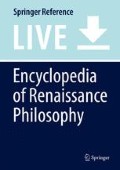Abstract
The doctrine of transcendentals – a key doctrine of medieval metaphysics – is of minor interest to Renaissance philosophers. However, some of them pick up focal points of the doctrine and transform them according to the more “practical” approach, genuine to Renaissance philosophy. Lorenzo Valla, for instance, criticizes the doctrine from a linguistic perspective. Giovanni Pico della Mirandola, on the other hand, develops it further into a doctrine with ethical impact. The traditional approach, however, is further advanced in late medieval schools, from where it entered early modern discussions.
References
Primary Literature
Aquinas, Thomas. 1975. Quaestiones disputatae de veritate. Edited by the Dominican Friars. Roma: Editori di San Tommaso.
Javelli, Crisostomo. 1547. Epitome in universam Aristotelis philosophiam: Tractatus de transcendentibus praevius Metaphysices. Venetiis: Apud Hieronymum Scotum.
Maior, John. 1514. Summulae, nunquam antea impressae. Parisiis: A Johanne Granjon.
Melanchthon, Philip. 1846. Erotemata dialectices. Edited by C.G. Bretschneider. Halis Saxonum: Apud C. A. Schwetschke et filium. Cols 513–752.
Pico della Mirandola, Giovanni. 1993. Œuvres philosophiques. Ed. and Trans. O. Boulnois and G. Tognon. Paris: Presses universitaires de France.
Valla, Lorenzo. 1981. Repastinatio dialecticae et philosophiae. Edited by G. Zippel. Padova: Editrice Antenore.
Vives, Juan Luis. 1990. De causis corruptarum artium. Edited by E. Hidalgo-Serna. München: Fink.
Secondary Literature
Aertsen, Jan A. 2012. Medieval philosophy as transcendental thought. From Philip the Chancellor (ca. 1225) to Francisco Suárez. Leiden/Boston: Brill.
Darge, Rolf. 2004. Suárezʼ transzendentale Seinsauslegung und die Metaphysiktradition. Leiden/Boston: Brill.
Federici Vescovini, Graziella, ed. 2002. Le problème des transcendantaux du XIVe au XVIIe siècle. Paris: Vrin.
Goris, Wouter, and Jan A. Aertsen. 2016. Medieval theories of transcendentals. The Stanford encyclopedia of philosophy (Winter 2016 Edition). Edited by E.N. Zalta. http://plato.stanford.edu/archives/win2016/entries/transcendentals-medieval. Accessed 17 Dec 2018.
Author information
Authors and Affiliations
Corresponding author
Editor information
Editors and Affiliations
Section Editor information
Rights and permissions
Copyright information
© 2019 Springer Nature Switzerland AG
About this entry
Cite this entry
Jeschke, T. (2019). Transcendentals in the Renaissance. In: Sgarbi, M. (eds) Encyclopedia of Renaissance Philosophy. Springer, Cham. https://doi.org/10.1007/978-3-319-02848-4_1048-1
Download citation
DOI: https://doi.org/10.1007/978-3-319-02848-4_1048-1
Received:
Accepted:
Published:
Publisher Name: Springer, Cham
Print ISBN: 978-3-319-02848-4
Online ISBN: 978-3-319-02848-4
eBook Packages: Springer Reference Religion and PhilosophyReference Module Humanities and Social SciencesReference Module Humanities

